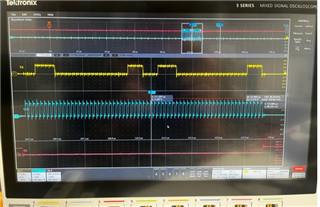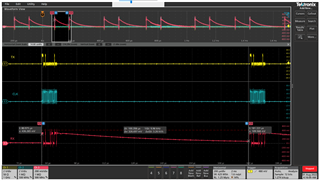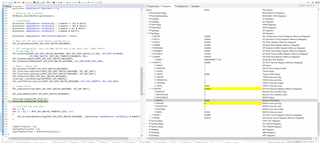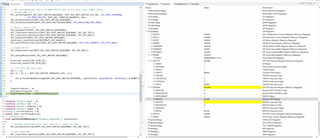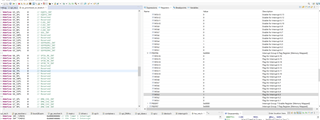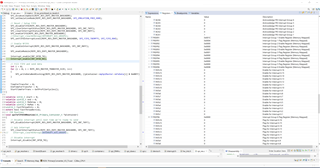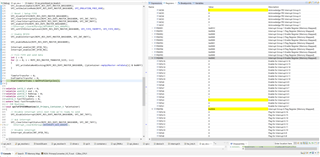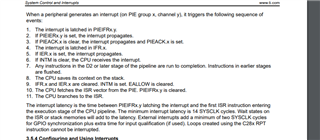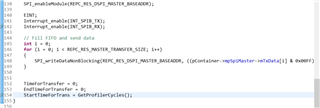Hello,
I am requesting SPI master FIFO transfers by enabling the TX interrupt every ~5000 CPU cycles. However, I am seeing that the time from when I enable the TX FIFO interrupt to the interrupt triggering is ~15000 CPU cycles.
Here is how I'm requesting a transfer:
// Processes
// Start sequence of SPI Master read/write register operations to Resolver chip - Blocking
void SpiMaster_StartTransfer(GE_Primary_Container_t *pContainer, uint32_t command)
{
TxEnd = GetProfilerCycles();
TxTime = CalcProfilerTime(TxStart, TxEnd);
pContainer->mpSpiMaster->mDataRecv = 0;
// Reset Rx and Tx Buffers
SPIMaster_ResetBuffers(pContainer);
// TransferData
pContainer->mpSpiMaster->mTxData[0] = (command >> 24) & 0xFFU;
pContainer->mpSpiMaster->mTxData[1] = (command >> 16) & 0xFFU;
pContainer->mpSpiMaster->mTxData[2] = (command >> 8) & 0xFFU;
pContainer->mpSpiMaster->mTxData[3] = (command & 0xFFU);
pContainer->mpSpiMaster->mIsTransferCompleted = false;
// Reset FIFO
SPI_disableFIFO(REPC_RES_DSPI_MASTER_BASEADDR);
SPI_enableFIFO(REPC_RES_DSPI_MASTER_BASEADDR);
SPI_setFIFOInterruptLevel(REPC_RES_DSPI_MASTER_BASEADDR, SPI_FIFO_TXEMPTY, SPI_FIFO_RX4);
// Enable TxFIFO
SPI_enableInterrupt(REPC_RES_DSPI_MASTER_BASEADDR, SPI_INT_TXFF);
SPI_enableInterrupt(REPC_RES_DSPI_MASTER_BASEADDR, SPI_INT_RXFF);
TxStart = GetProfilerCycles();
Tx2Start = GetProfilerCycles();
}
volatile int32_t start = 0;
volatile uint32_t end = 0;
volatile uint32_t RxDelay = 0;
// ISR Routines
void spiTxFIFOISRRoutine(GE_Primary_Container_t *pContainer)
{
Tx2End = GetProfilerCycles();
Tx2Time = CalcProfilerTime(Tx2Start, Tx2End);
int i = 0;
for (i = 0; i < REPC_RES_MASTER_TRANSFER_SIZE; i++)
{
SPI_writeDataNonBlocking(REPC_RES_DSPI_MASTER_BASEADDR, ((pContainer->mpSpiMaster->mTxData[i] & 0x00FF) << 8));
}
// Do nothing on Tx (we initiate this manually)
SPI_clearInterruptStatus(REPC_RES_DSPI_MASTER_BASEADDR, SPI_INT_TXFF);
Interrupt_clearACKGroup(INTERRUPT_ACK_GROUP6);
// Disable interrupt until next time we're ready to send
SPI_disableInterrupt(REPC_RES_DSPI_MASTER_BASEADDR, SPI_INT_TXFF);
start = GetProfilerCycles();
}
void spiRxFIFOISRRoutine(GE_Primary_Container_t *pContainer)
{
if(!pContainer->mpSpiMaster->mIsTransferCompleted)
{
// We should get 32 bits back
int i = 0;
for (i = 0; i < REPC_RES_MASTER_TRANSFER_SIZE; i++)
{
pContainer->mpSpiMaster->mRxData[i] = (SPI_readDataNonBlocking(REPC_RES_DSPI_MASTER_BASEADDR) & 0x00FF);
}
pContainer->mpSpiMaster->mIsTransferCompleted = true;
end = GetProfilerCycles();
RxDelay = CalcProfilerTime(start, end);
}
SPI_clearInterruptStatus(REPC_RES_DSPI_MASTER_BASEADDR, SPI_INT_RXFF);
Interrupt_clearACKGroup(INTERRUPT_ACK_GROUP6);
// Disable interrupt until next time we're ready to send
SPI_disableInterrupt(REPC_RES_DSPI_MASTER_BASEADDR, SPI_INT_RXFF);
}
Here is my initialization code:
// Init SPI1 Interface to resolver
void SPIMaster_Init(GE_Primary_Container_t *pContainer)
{
// Register interrupt ISRs
Interrupt_register(INT_SPIB_TX, &spiBTxFIFOISR);
Interrupt_register(INT_SPIB_RX, &spiBRxFIFOISR);
// Must put SPI into reset before configuring it
SPI_disableModule(REPC_RES_DSPI_MASTER_BASEADDR);
// SPI configuration. Use a 12.5MHz SPICLK and 32-bit word size, 25MHz LSPCLK
// Rising edge SPI
SPI_setConfig(REPC_RES_DSPI_MASTER_BASEADDR, REPC_RES_DSPI_MASTER_CLK_SRC, SPI_PROT_POL0PHA0,
SPI_MODE_MASTER, REPC_RES_TRANSFER_BAUDRATE, 8U);
SPI_disableLoopback(REPC_RES_DSPI_MASTER_BASEADDR);
SPI_setEmulationMode(REPC_RES_DSPI_MASTER_BASEADDR, SPI_EMULATION_FREE_RUN);
SPI_enableFIFO(REPC_RES_DSPI_MASTER_BASEADDR);
SPI_setFIFOInterruptLevel(REPC_RES_DSPI_MASTER_BASEADDR, SPI_FIFO_TXEMPTY, SPI_FIFO_RX4);
SPI_clearInterruptStatus(REPC_RES_DSPI_MASTER_BASEADDR, SPI_INT_TXFF);
SPI_clearInterruptStatus(REPC_RES_DSPI_MASTER_BASEADDR, SPI_INT_RXFF);
SPI_enableInterrupt(REPC_RES_DSPI_MASTER_BASEADDR, SPI_INT_RXFF);
// Configuration complete. Enable the module.
SPI_enableModule(REPC_RES_DSPI_MASTER_BASEADDR);
// Enable interrupts
Interrupt_enable(INT_SPIB_TX);
Interrupt_enable(INT_SPIB_RX);
// Init Master Buffers to 0
SPIMaster_ResetBuffers(pContainer);
// Init Control Variables
pContainer->mpSpiMaster->mIsTransferCompleted = false;
}
I thought maybe it was a priority issue. I'm requesting transfers from Group1 ADCA1_INT with priority 12 so I set my priority for Group 6 SPIB_TX and SPIB_RX to 6.
//###########################################################################
//
// FILE: sw_prioritized_isr_levels.h
//
// TITLE: Software Prioritized Interrupt Service Routine Level
// definitions.
//
//#############################################################################
//
//
// $Copyright:
// Copyright (C) 2021 Texas Instruments Incorporated - http://www.ti.com/
//
// Redistribution and use in source and binary forms, with or without
// modification, are permitted provided that the following conditions
// are met:
//
// Redistributions of source code must retain the above copyright
// notice, this list of conditions and the following disclaimer.
//
// Redistributions in binary form must reproduce the above copyright
// notice, this list of conditions and the following disclaimer in the
// documentation and/or other materials provided with the
// distribution.
//
// Neither the name of Texas Instruments Incorporated nor the names of
// its contributors may be used to endorse or promote products derived
// from this software without specific prior written permission.
//
// THIS SOFTWARE IS PROVIDED BY THE COPYRIGHT HOLDERS AND CONTRIBUTORS
// "AS IS" AND ANY EXPRESS OR IMPLIED WARRANTIES, INCLUDING, BUT NOT
// LIMITED TO, THE IMPLIED WARRANTIES OF MERCHANTABILITY AND FITNESS FOR
// A PARTICULAR PURPOSE ARE DISCLAIMED. IN NO EVENT SHALL THE COPYRIGHT
// OWNER OR CONTRIBUTORS BE LIABLE FOR ANY DIRECT, INDIRECT, INCIDENTAL,
// SPECIAL, EXEMPLARY, OR CONSEQUENTIAL DAMAGES (INCLUDING, BUT NOT
// LIMITED TO, PROCUREMENT OF SUBSTITUTE GOODS OR SERVICES; LOSS OF USE,
// DATA, OR PROFITS; OR BUSINESS INTERRUPTION) HOWEVER CAUSED AND ON ANY
// THEORY OF LIABILITY, WHETHER IN CONTRACT, STRICT LIABILITY, OR TORT
// (INCLUDING NEGLIGENCE OR OTHERWISE) ARISING IN ANY WAY OUT OF THE USE
// OF THIS SOFTWARE, EVEN IF ADVISED OF THE POSSIBILITY OF SUCH DAMAGE.
// $
//#############################################################################
#ifndef SW_PRIORITZIED_ISR_LEVELS_H
#define SW_PRIORITZIED_ISR_LEVELS_H
#ifdef __cplusplus
extern "C" {
#endif
//
// Mask for interrupt groups
//
#define M_INT1 0x0001 // INT1 Mask
#define M_INT2 0x0002 // INT2 Mask
#define M_INT3 0x0004 // INT3 Mask
#define M_INT4 0x0008 // INT4 Mask
#define M_INT5 0x0010 // INT5 Mask
#define M_INT6 0x0020 // INT6 Mask
#define M_INT7 0x0040 // INT7 Mask
#define M_INT8 0x0080 // INT8 Mask
#define M_INT9 0x0100 // INT9 Mask
#define M_INT10 0x0200 // INT10 Mask
#define M_INT11 0x0400 // INT11 Mask
#define M_INT12 0x0800 // INT12 Mask
#define M_INT13 0x1000 // INT13 Mask
#define M_INT14 0x2000 // INT14 Mask
#define M_DLOG 0x4000 // DLOGINT Mask
#define M_RTOS 0x8000 // RTOSINT Mask
//
// Interrupt Enable Register Allocation:
// Interrupts can be enabled/disabled using the CPU interrupt enable register
// (IER) and the PIE interrupt enable registers (PIEIER1 to PIEIER12).
//
//
// Set "Global" Interrupt Priority Level (IER register):
//
// The user must set the appropriate priority level for each of the CPU
// interrupts. This is termed as the "global" priority. The priority level
// must be a number between 1 (highest) to 16 (lowest). A value of 0 must
// be entered for reserved interrupts or interrupts that are not used.
//
// Note: The priority levels below are used to calculate the IER register
// interrupt masks MINT1 to MINT16.
//
// Note: The priority levels shown here may not make sense in a
// real application. This is for demonstration purposes only!!!
//
// The user should change these to values that make sense for
// their application.
//
// 0 = not used
// 1 = highest priority
// ...
// 16 = lowest priority
//
#define INT1PL 12 // Global Priority for Group1 Interrupts
#define INT2PL 0 // Global Priority for Group2 Interrupts
#define INT3PL 0 // Global Priority for Group3 Interrupts
#define INT4PL 0 // Global Priority for Group4 Interrupts
#define INT5PL 0 // Global Priority for Group5 Interrupts
#define INT6PL 6 // Global Priority for Group6 Interrupts
#define INT7PL 15 // Global Priority for Group7 Interrupts
#define INT8PL 0 // Global Priority for Group8 Interrupts
#define INT9PL 15 // Global Priority for Group9 Interrupts
#define INT10PL 0 // Global Priority for Group10 Interrupts
#define INT11PL 0 // Global Priority for Group11 Interrupts
#define INT12PL 14 // Global Priority for Group12 Interrupts
#define INT13PL 0 // Global Priority for INT13 (TINT1)
#define INT14PL 0 // Global Priority for INT14 (TINT2)
#define INT15PL 0 // Global Priority for DATALOG
#define INT16PL 0 // Global Priority for RTOSINT
//
// Set "Group" Interrupt Priority Level (PIEIER1 to PIEIER12 registers):
//
// The user must set the appropriate priority level for each of the PIE
// interrupts. This is termed as the "group" priority. The priority level
// must be a number between 1 (highest) to 16 (lowest). A value of 0 must
// be entered for reserved interrupts or interrupts that are not used.
//
// Note: The priority levels below are used to calculate the following
// PIEIER register interrupt masks:
// MG1_1 to MG1_16
// MG2_1 to MG2_16
// MG3_1 to MG3_16
// MG4_1 to MG4_16
// MG5_1 to MG5_16
// MG6_1 to MG6_16
// MG7_1 to MG7_16
// MG8_1 to MG8_16
// MG9_1 to MG9_16
// MG10_1 to MG10_16
// MG11_1 to MG11_16
// MG12_1 to MG12_16
//
// Note: The priority levels shown here may not make sense in a
// real application. This is for demonstration purposes only!!!
//
// The user should change these to values that make sense for
// their application.
//
// 0 = not used
// 1 = highest priority
// ...
// 16 = lowest priority
//
#define G1_1PL 12 // ADCA1_INT
#define G1_2PL 12 // ADCB1_INT
#define G1_3PL 12 // ADCC1_INT
#define G1_4PL 14 // XINT1_INT
#define G1_5PL 14 // XINT2_INT
#define G1_6PL 0 // Reserved
#define G1_7PL 14 // TIMER0_INT
#define G1_8PL 0 // WAKE_INT
#define G1_9PL 0 // Reserved
#define G1_10PL 0 // Reserved
#define G1_11PL 0 // Reserved
#define G1_12PL 0 // Reserved
#define G1_13PL 0 // Reserved
#define G1_14PL 0 // Reserved
#define G1_15PL 0 // Reserved
#define G1_16PL 0 // Reserved
#define G2_1PL 0 // EPWM1_TZ_INT
#define G2_2PL 0 // EPWM2_TZ_INT
#define G2_3PL 0 // EPWM3_TZ_INT
#define G2_4PL 0 // EPWM4_TZ_INT
#define G2_5PL 0 // EPWM5_TZ_INT
#define G2_6PL 0 // EPWM6_TZ_INT
#define G2_7PL 0 // EPWM7_TZ_INT
#define G2_8PL 0 // EPWM8_TZ_INT
#define G2_9PL 0 // Reserved
#define G2_10PL 0 // Reserved
#define G2_11PL 0 // Reserved
#define G2_12PL 0 // Reserved
#define G2_13PL 0 // Reserved
#define G2_14PL 0 // Reserved
#define G2_15PL 0 // Reserved
#define G2_16PL 0 // Reserved
#define G3_1PL 0 // EPWM1_INT
#define G3_2PL 0 // EPWM2_INT
#define G3_3PL 0 // EPWM3_INT
#define G3_4PL 0 // EPWM4_INT
#define G3_5PL 0 // EPWM5_INT
#define G3_6PL 0 // EPWM6_INT
#define G3_7PL 0 // EPWM7_INT
#define G3_8PL 0 // EPWM8_INT
#define G3_9PL 0 // Reserved
#define G3_10PL 0 // Reserved
#define G3_11PL 0 // Reserved
#define G3_12PL 0 // Reserved
#define G3_13PL 0 // Reserved
#define G3_14PL 0 // Reserved
#define G3_15PL 0 // Reserved
#define G3_16PL 0 // Reserved
#define G4_1PL 0 // ECAP1_INT
#define G4_2PL 0 // ECAP2_INT
#define G4_3PL 0 // ECAP3_INT
#define G4_4PL 0 // ECAP4_INT
#define G4_5PL 0 // ECAP5_INT
#define G4_6PL 0 // ECAP6_INT
#define G4_7PL 0 // ECAP7_INT
#define G4_8PL 0 // Reserved
#define G4_9PL 0 // Reserved
#define G4_10PL 0 // Reserved
#define G4_11PL 0 // Reserved
#define G4_12PL 0 // Reserved
#define G4_13PL 0 // Reserved
#define G4_14PL 0 // ECAP6_2_INT
#define G4_15PL 0 // ECAP7_2_INT
#define G4_16PL 0 // Reserved
#define G5_1PL 0 // EQEP1_INT
#define G5_2PL 0 // EQEP2_INT
#define G5_3PL 0 // Reserved
#define G5_4PL 0 // Reserved
#define G5_5PL 0 // CLB1_INT
#define G5_6PL 0 // CLB2_INT
#define G5_7PL 0 // CLB3_INT
#define G5_8PL 0 // CLB4_INT
#define G5_9PL 0 // SD1_INT
#define G5_10PL 0 // Reserved
#define G5_11PL 0 // Reserved
#define G5_12PL 0 // Reserved
#define G5_13PL 0 // SDFM1DR1_INT
#define G5_14PL 0 // SDFM1DR2_INT
#define G5_15PL 0 // SDFM1DR3_INT
#define G5_16PL 0 // SDFM1DR4_INT
#define G6_1PL 6 // SPIA_RX_INT
#define G6_2PL 6 // SPIA_TX_INT
#define G6_3PL 6 // SPIB_RX_INT
#define G6_4PL 6 // SPIB_TX_INT
#define G6_5PL 0 // Reserved
#define G6_6PL 0 // Reserved
#define G6_7PL 0 // Reserved
#define G6_8PL 0 // Reserved
#define G6_9PL 0 // Reserved
#define G6_10PL 0 // Reserved
#define G6_11PL 0 // Reserved
#define G6_12PL 0 // Reserved
#define G6_13PL 0 // Reserved
#define G6_14PL 0 // Reserved
#define G6_15PL 0 // Reserved
#define G6_16PL 0 // Reserved
#define G7_1PL 0 // DMA_CH1_INT
#define G7_2PL 0 // DMA_CH2_INT
#define G7_3PL 0 // DMA_CH3_INT
#define G7_4PL 0 // DMA_CH4_INT
#define G7_5PL 13 // DMA_CH5_INT
#define G7_6PL 13 // DMA_CH6_INT
#define G7_7PL 0 // Reserved
#define G7_8PL 0 // Reserved
#define G7_9PL 0 // Reserved
#define G7_10PL 0 // Reserved
#define G7_11PL 0 // FSITXA1_INT
#define G7_12PL 0 // FSITXA2_INT
#define G7_13PL 0 // FSIRXA1_INT
#define G7_14PL 0 // FSIRXA2_INT
#define G7_15PL 0 // CLA1PROMCRC_INT
#define G7_16PL 0 // DCC_INT
#define G8_1PL 0 // I2CA_INT
#define G8_2PL 0 // I2CA_FIFO_INT
#define G8_3PL 0 // Reserved
#define G8_4PL 0 // Reserved
#define G8_5PL 0 // Reserved
#define G8_6PL 0 // Reserved
#define G8_7PL 0 // Reserved
#define G8_8PL 0 // Reserved
#define G8_9PL 0 // LINA0_INT
#define G8_10PL 0 // LINA1_INT
#define G8_11PL 0 // Reserved
#define G8_12PL 0 // Reserved
#define G8_13PL 0 // PMBUSA_INT
#define G8_14PL 0 // Reserved
#define G8_15PL 0 // Reserved
#define G8_16PL 0 // Reserved
#define G9_1PL 13 // SCIA_RX_INT
#define G9_2PL 13 // SCIA_TX_INT
#define G9_3PL 0 // SCIB_RX_INT
#define G9_4PL 0 // SCIB_TX_INT
#define G9_5PL 0 // CANA0_INT
#define G9_6PL 0 // CANA1_INT
#define G9_7PL 0 // CANB0_INT
#define G9_8PL 0 // CANB1_INT
#define G9_9PL 0 // Reserved
#define G9_10PL 0 // Reserved
#define G9_11PL 0 // Reserved
#define G9_12PL 0 // Reserved
#define G9_13PL 0 // Reserved
#define G9_14PL 0 // Reserved
#define G9_15PL 0 // Reserved
#define G9_16PL 0 // Reserved
#define G10_1PL 0 // ADCA_EVT_INT
#define G10_2PL 0 // ADCA2_INT
#define G10_3PL 0 // ADCA3_INT
#define G10_4PL 0 // ADCA4_INT
#define G10_5PL 0 // ADCB_EVT_INT
#define G10_6PL 0 // ADCB2_INT
#define G10_7PL 0 // ADCB3_INT
#define G10_8PL 0 // ADCB4_INT
#define G10_9PL 0 // ADCC_EVT_INT
#define G10_10PL 0 // ADCC2_INT
#define G10_11PL 0 // ADCC3_INT
#define G10_12PL 0 // ADCC4_INT
#define G10_13PL 0 // Reserved
#define G10_14PL 0 // Reserved
#define G10_15PL 0 // Reserved
#define G10_16PL 0 // Reserved
#define G11_1PL 0 // CLA1_1_INT
#define G11_2PL 0 // CLA1_2_INT
#define G11_3PL 0 // CLA1_3_INT
#define G11_4PL 0 // CLA1_4_INT
#define G11_5PL 0 // CLA1_5_INT
#define G11_6PL 0 // CLA1_6_INT
#define G11_7PL 0 // CLA1_7_INT
#define G11_8PL 0 // CLA1_8_INT
#define G11_9PL 0 // Reserved
#define G11_10PL 0 // Reserved
#define G11_11PL 0 // Reserved
#define G11_12PL 0 // Reserved
#define G11_13PL 0 // Reserved
#define G11_14PL 0 // Reserved
#define G11_15PL 0 // Reserved
#define G11_16PL 0 // Reserved
#define G12_1PL 14 // XINT3_INT
#define G12_2PL 0 // XINT4_INT
#define G12_3PL 0 // XINT5_INT
#define G12_4PL 0 // PBIST_INT
#define G12_5PL 0 // FMC_INT
#define G12_6PL 0 // VCU_INT
#define G12_7PL 0 // FPU_OVERFLOW_ISR
#define G12_8PL 0 // FPU_UNDERFLOW_ISR
#define G12_9PL 0 // Reserved
#define G12_10PL 0 // RAM_CORRECTABLE_ERROR_ISR
#define G12_11PL 0 // FLASH_CORRECTABLE_ERROR_ISR
#define G12_12PL 0 // RAM_ACCESS_VIOLATION_INT
#define G12_13PL 0 // SYS_PLL_SLIP_INT
#define G12_14PL 0 // Reserved
#define G12_15PL 0 // CLA_OVERFLOW_INT
#define G12_16PL 0 // CLA_UNDERFLOW_INT
//
// Include the header file with software interrupt prioritization logic
//
#include "sw_interrupt_prioritization_logic.h"
#ifdef __cplusplus
}
#endif /* extern "C" */
#endif // eof
//
// End of file
//
Do you have any ideas what I'm doing to cause the TX FIFO interrupt to take so long to trigger?


